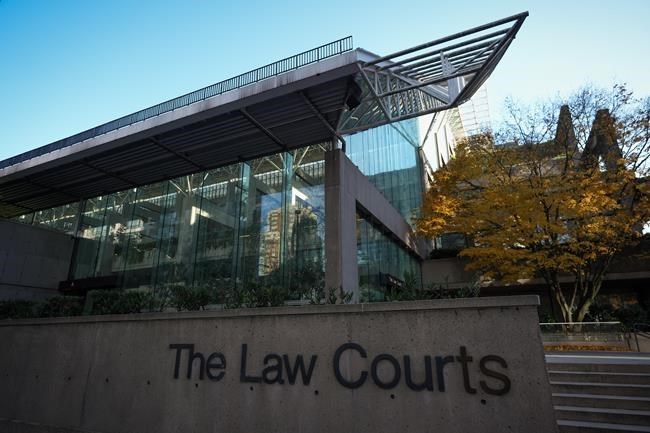VANCOUVER — The father of a murdered 13-year-old girl has been under police investigation for allegedly bringing a gun into a Vancouver courtroom on the day that Ibrahim Ali was convicted of the killing, the man's lawyer has told a hearing.
Lawyers for Ali are refusing to show up to court for post-trial proceedings citing safety concerns about the man, who can't be named because of a publication ban on the identity of the murdered girl.
One of the lawyers, Kevin McCullough, said in an interview last month that Victoria Police advised him of the Dec. 8 gun incident two days later, telling him that the man brought a loaded Glock gun to court with an "intent to kill."
McCullough and co-counsel Ben Lynskey are trying to have the father excluded from attending Ali's post-trial hearings in any way, and don't want a Mandarin court interpreter to translate for him.
The father of the girl has retained a lawyer to fight for the right to listen to the post-trial hearings.
The man has not been charged, his lawyer Brock Martland said.
But court documents show he will face court next month about the disposal of items police seized from him on Dec. 9, the day after the verdict.
A spokeswoman for the BC Prosecution Service said the man also faced a "prohibition order."
A "prohibition order" under the Criminal Code can refer to a ban on possessing a "firearm, crossbow, prohibited weapon, restricted weapon, prohibited device, ammunition, prohibited ammunition and explosive substance."
The man is due to appear at Surrey Provincial Court next month.
Martland told B.C. Supreme Court that his client was the subject of a police investigation, but argued he still had a right to listen to proceedings as the father of the victim and as a party with legal interests in the matter.
"No charges have been proved or laid (in) an investigation about an allegation that he had a firearm in the court in December of last year. The Vancouver Police Department has imposed an undertaking that includes an area of restriction, this courthouse and within a few blocks of this courthouse," Martland said.
Ali, who appeared by video Wednesday, was convicted last month of first-degree murder in the girl's killing. Her body was found in a Burnaby, B.C., park in July 2017. Ali is yet to be sentenced but faces a mandatory life term with no chance of parole for 25 years.
On Wednesday, Lynskey and McCullough sent their colleague, Tim Russell, to argue their application to exclude the father.
The proceedings were heard in Courtroom 20, a high-security room built specifically for the Air India terrorism trial. The court is surrounded by bulletproof glass that separates it from the public gallery.
An email from Vancouver Police to Ali's lawyers on Dec. 11 said the father was subject to a "no contact undertaking" with the lawyers of that day, and the man "must not enter" the vicinity of the Supreme Court in Vancouver.
The email, which was previously shared with The Canadian Press by Lynskey, says if the father breaches the undertaking the lawyers should call 911 immediately.
The Vancouver Police Department confirmed on Dec. 12 that a man had been arrested and an investigation into allegations that a person brought a weapon into the Vancouver Law Courts during the Ali trial was underway.
Martland said in court on Wednesday that his client was "seeking a narrow form of involvement" in the post-trial proceedings.
"What he will be seeking is not a ruling that says he can come into the courtroom, but rather that he be permitted indirectly, that an interpreter, attending by phone, would relay information," Martland said.
"We seek to be involved in this application, including access to materials."
He suggested that if there was a complaint about his client breaching the no-contact undertaking, defence counsel should contact police, echoing the emailed advice from the police department.
Crown lawyer Daniel Porte told the judge that the Crown supported an application by the father for standing in the proceedings.
Russell disagreed, saying the issue was whether the fears held by Lynskey and McCullough were reasonable.
"To have a target on your back and realize you were a coin toss away from having shots fired would instil the most reasonable fear in anyone," he told the court Wednesday, adding that anyone in the courtroom on Dec. 8 was also a victim in the matter.
"Were not seeking to do anything that would undermine the open court principle," he said. "We are seeking to ensure that Mr. Ali can have a fair trial in accordance with the principles of fundamental justice with counsel who are free to make submissions without fear, without intimidation, without distraction."
He argued that the father is in the "position of the accused in the context" of the application.
"I understand that the issue of the larger trial is that he falls within the category of victim, but on the issue before you the status as a victim has no bearing," he told the judge.
Justice Lance Bernard ruled in favour of the father's application for standing on Wednesday, but has not ruled on the broader application to ban him from listening in.
The man's son did not immediately respond to a request for comment, left by voice mail.
This report by The Canadian Press was first published Jan. 24, 2024.
Brieanna Charlebois, The Canadian Press




